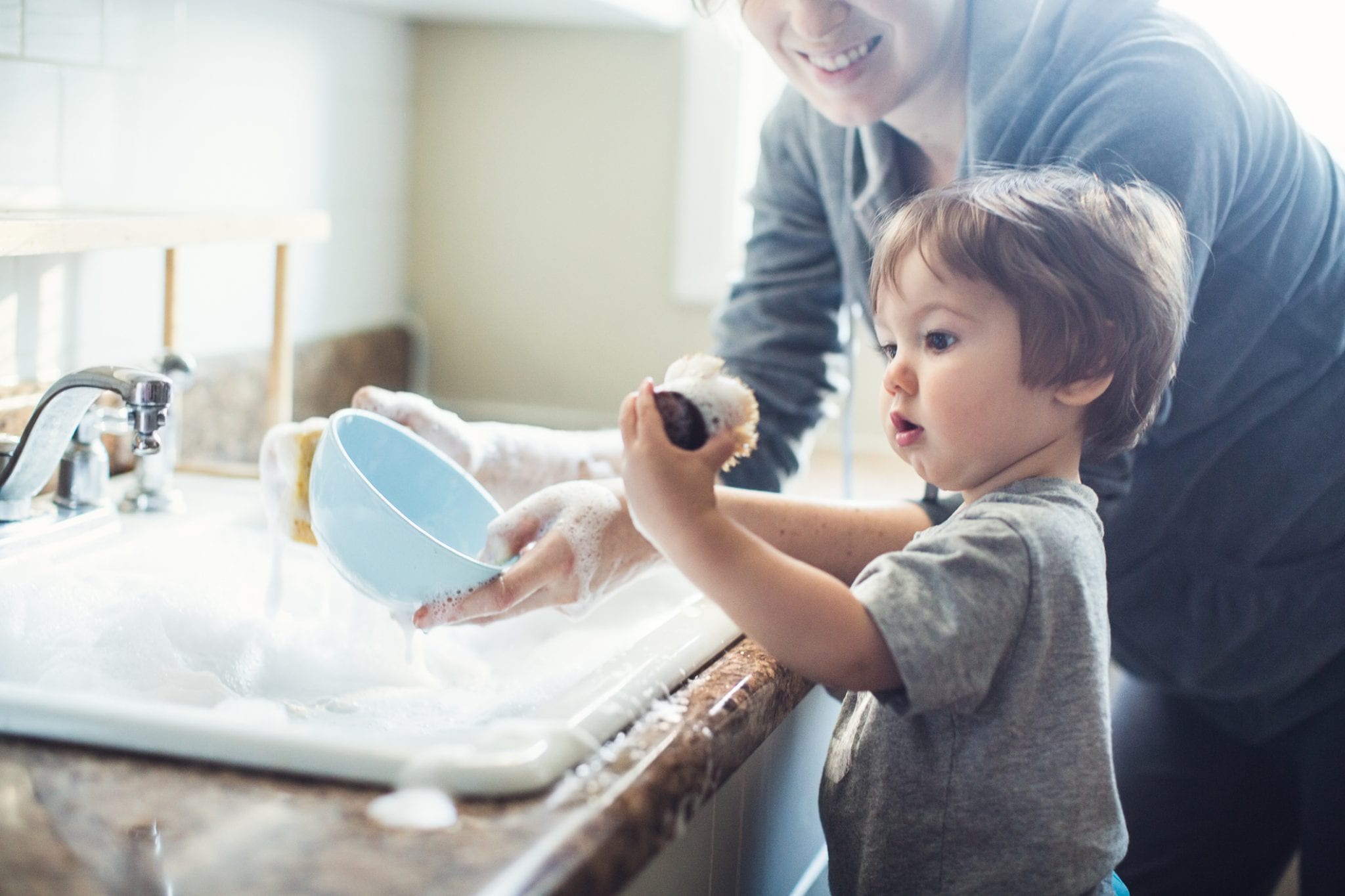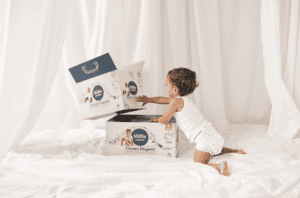How much does your toddler help around the house? If you’re shaking your head saying, “Huh? I can barely get my kid to pick up their toys,” don’t worry. You’re one of a bazillion parents. Heck, my six-year-old has days when he’d rather do anything other than clean his room. Not that long ago, though, he was obsessed with helping around the house. And no, he wasn’t forced or even bribed, really. I simply seized the day and started toddler chores early. And now, while he’s like any other kid, he doesn’t mind contributing to household tasks. You can get there with your kids, too. Here are a few tips to get you started delegating toddler chores.
1. It’s Not a Chore, It’s An Activity
Have you ever thought about why we refer to housework as “chores?”
It’s a mindset issue. From generation to generation, most of us grew up knowing that cleaning or cooking is no fun. We grew up watching adults with tired faces putter around the house making things happen for our comfort and well-being. Were told to go play until dinner’s ready. We were scolded for being underfoot.
But guess what? During their first six years of life, kids go through their sensitive periods. Coined by Maria Montessori, so-called sensitive periods are phases of development during which kids grow through an intense interest in a concept or activity.1
During toddlerhood, children go through their sensory phase. Activities that cater to the senses stimulate them and help them explore. And what are most household chores, if not sensory activities? Think about it:
- Cleaning engages the sense of touch.
- Food prep engages the senses of taste, smell, and touch.
- Planting engages touch and smell.
You get the idea. Anything to do with helping around the house is a sensory activity. This triggers oodles of excitement in the average toddler.
So seize the opportunity as I did. Approach cleaning, cooking, organizing, etc., like an activity. As a matter of fact, try to eliminate the word “chore” from the conversation. A chore is synonymous with duty, and duty dampens the fun.
Match your child’s enthusiasm during the activity. This way, they’re learning to take care of their environment without even realizing it. To them, it’s a game, like finger painting and stacking shapes. They approach it with the same zeal, and chances are, this approach will stick with them as they grow.
2. Let Them Help
Previous generations are often quick to point and say, “Oh, they’re so spoiled.”
This blanket statement covers everyone from older kids to millennials. But are they really spoiled, or is it learned helplessness?2 Back when our parents scolded us for being in the way before dinner was ready, we were all probably itching to help.
So let’s end the era of learned helplessness. Try to let your kid tag along while you’re doing house chores. Sure, they can’t help with everything, and in some cases, it’s not even safe for them to be around. But try to incorporate their willingness to help whenever you can.
When my guy was little, I let him do laundry with me. It was sort of a bonding and teaching moment for us.
Sorting the clothes gave us a chance to work on his colors. Then, once they were dry, he folded the clothes with me and helped put them in the right bins: Either daddy’s, his, or mine.
In one activity, we got to work on colors, sorting, and folding. I swear he learned his colors thanks to our laundry bonding sessions. Also, he can fold clothes like nobody’s business at age six. His future spouse will thank me for it!
Did it take longer to do laundry with my son? Yeah, sure it did. But I made sure to be patient with him. I told myself it would pay off in the long run. Laundry used to be my mindless me-time chore. Then, it evolved into a teaching opportunity for my son. And that’s okay. That’s motherhood.
I still get my me-time laundry days now since the novelty wore off a little over the years. My little guy is no longer disappointed if he misses out. But the point is, he can and will help without a fight.
3. Make Rules, Start Small
Of course, your child won’t become a pint-size cleaning robot overnight. (That’s what a Roomba is for.) But over time, a good routine and some expectations can build a healthy attitude toward chores.
Start with some simple responsibilities. Picking up toys is the most obvious one to me. Instead of just reminding your child to clean up his/her toys, make it easier with one simple restriction: One toy or activity at a time.
When my son started preschool, I asked his teacher for a good strategy to enforce the one toy at a time rule. I knew that was a standard of Montessori, and I wanted to implement that at home. Because yes, like most new parents, I was inundated with a living room that looked like the aftermath of a toy tornado.
The kind, wise teacher told me to keep persisting with the one-toy policy. And she said to take away any toys that weren’t put away at the end of the day. I won’t lie: At first, I thought that was cruel. Why would I do that to my sweet little three-year-old?
But I’m learning that nothing works so well as natural consequences when trying to set expectations. I held out on taking away the toys and try as I might, the one toy at a time policy just didn’t click. So I caved and took away the toys at the end of one day, and sure enough, my son definitely noticed the next day. A few more instances later, the concept of cleaning up his toys finally hit home. Sure, he still needs reminders, and it helps that I compare the expectations at home to those at school. But he knows the rules and why he should stick to them.
I explain that if he takes out too many toys at a time, he gets overwhelmed, and it’s harder to clean up. So I take the toys away not to be mean but to ensure he has less to clean next time around. It’s logic he can understand, but it comes with results he doesn’t like, so the little guy makes an effort to contain his mess.
4. Make Them Love Their Environment
I don’t know about you, but when I don’t care much about something, I am naturally not as interested in maintaining or improving it. It’s not a trait I’m especially proud of, but it’s one we all share. Little kids have it in spades. Therefore, caring for their environment as well as for themselves needs to be taught by us parents.
The easiest way to teach a child to care about their environment is to model it for them. Prepare their environment, whether it be the kitchen, their playroom, or their bedroom. Make it neat and accessible to them, and emphasize some sort of order you both find appealing.
- Talk to your kids about how beautiful and fun their environment is. Talk about how important it is for a family to take care of their home so everyone can be comfortable and happy.
- Take on home beautification projects like gardening, polishing furniture, or even dusting. Your kids will get a kick out of these activities and their results.
- Before long, your kids will associate common house chores with aesthetic and sensory pleasure.
- And voila! They’ll look forward to keeping things tidy.
My son loved cleaning mirrors and our fridge when he was small. It yielded instant, shiny results, and he could clean them quickly enough. And a cool bonus: He learned to clean from left to right and top to bottom, which somehow helped him with the order of reading.
5. Reward Chores With Chores
Did you know that once you get your kids psyched about toddler chores, you can actually bribe them with more chores?
I’m not kidding. The household tasks you find mundane might actually be a reward for your toddlers. Here’s how:
- Figure out which toddler chores your kid loves.
- Pinpoint which ones he or she struggles with.
- Use the pleasurable chores as an incentive for doing the less fun ones.
For instance, my son still forgets to put his clothes in his hamper and clear the table after dinner. Both are things I expect of him. And I’ll admit: He still hates putting his toys away, even if he does understand why he should.
When nothing else works, I’ll tell him that he can help with food prep if all his toys are put away. Or he can help clean a toilet if he picks up the clothes from his bedroom floor. (Yes, my kid is excited about cleaning toilets with a Clorox Toilet Wand for some reason. Weird, I know. Don’t judge.)
This way, the chores he likes become privileges, and double the chores get done. It’s a priceless tactic. Don’t ask if it works on teenagers, but it sure does on toddlers. Let’s reap the benefits while we can.
I know that involving your toddler in chores might not come easily. Giving little kids meaningful tasks requires a lot of patience and the understanding that the results won’t be perfect. But if you can appreciate that a bit more time spent now can instill lifelong healthy habits, it’s all worthwhile.






























